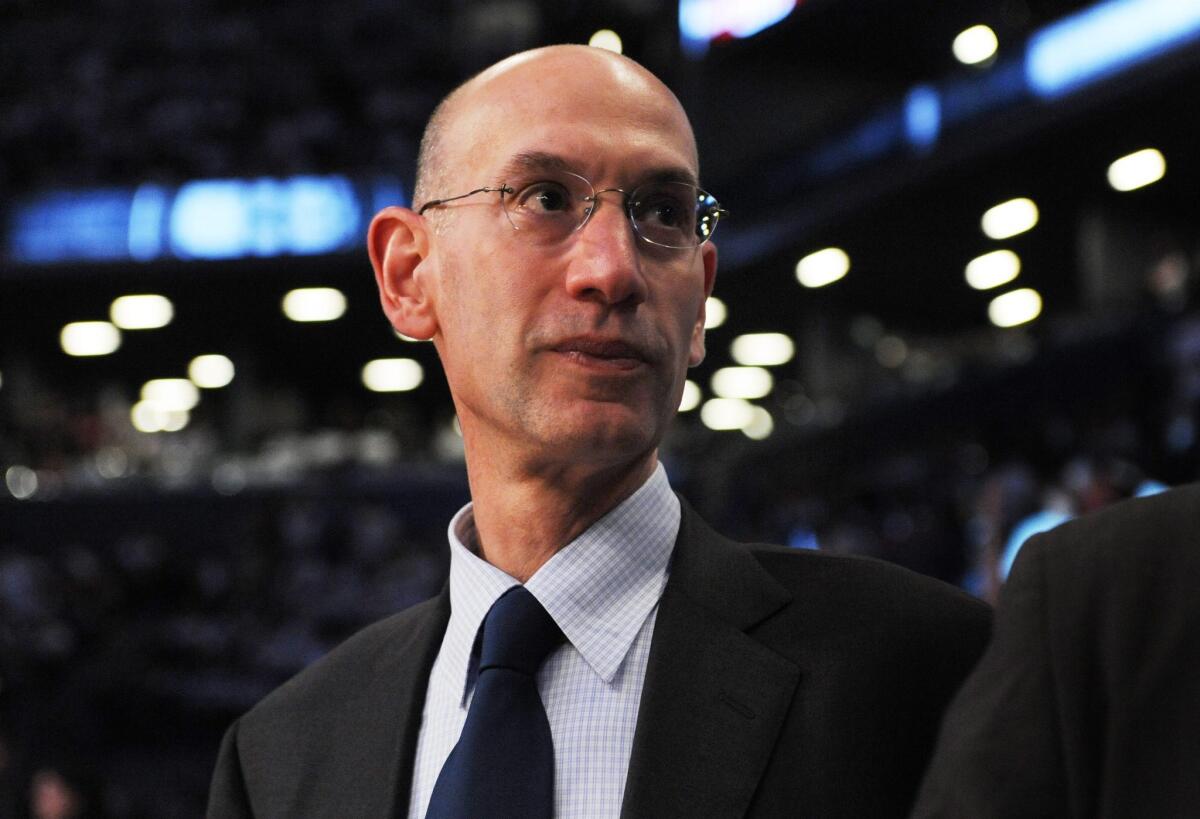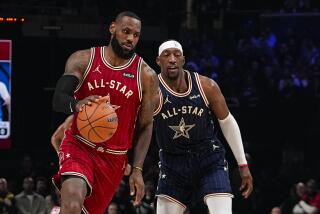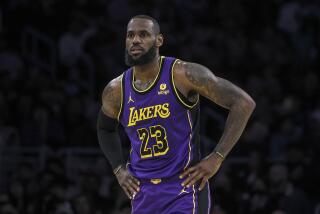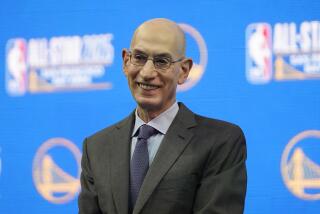Op-Ed: The NBA should be selling basketball <i>and</i> an education

Spurred by outrage from fans and players alike, new NBA Commissioner Adam Silver acted with admirable swiftness in addressing the blatant racism of Donald Sterling. Now the NBA should turn its attention to a more subtle and pervasive form of racial inequity.
The problem is rooted, paradoxically, in basketball’s enormous success over the last few decades. Perhaps the most popular sport in the nation, professional basketball has become enormously lucrative, and NBA players are among the most recognizable and highly paid athletes in the world, commanding an average annual salary of more than $4 million. Since nearly 80% of players in the league are black, NBA players are one of the most visible symbols of successful black manhood.
Basketball has been heavily marketed to the American public, and not only by the NBA. A number of sports-related companies, Nike being the most prominent, have helped professional basketball achieve its current level of popularity and have in turn profited from the association. It is difficult to imagine Nike having attained its market value of nearly $50 billion without its relationship to the National Basketball Assn. and its stars, starting with the introduction in the mid-1980s of the enormously popular Air Jordan brand of basketball shoes. Like many savvy marketers, Nike created a fantasy to which consumers could aspire.
We should rejoice in the success of the NBA and of companies like Nike, but we also need to recognize the social problems that have become intertwined with their success. Among the most adamant believers in the dream of NBA stardom are black boys, who often grow up in economically disadvantaged circumstances and in homes without fathers. For many of them, the NBA and its players are the most salient and pervasive image of successful black masculinity they see. And for young black boys trying to figure out how to be men, the lure can be irresistible.
One consequence of the NBA’s spectacular success is the growth of Amateur Athletic Union basketball. In the 1970s, when the NBA was struggling, there were few AAU teams. Now, they are everywhere, and tournaments frequently have hundreds of teams. The largest I’ve attended (with my own basketball-playing son) claimed to have 1,500 teams with more than 15,000 players. And AAU basketball, like the NBA, is disproportionately African American.
Although formally independent of the professional basketball league, AAU teams operate in its shadow. Not only do many of its young players nurture a dream, however unrealistic, of playing in the NBA one day, some teams are sponsored by current or former NBA players. Reebok sponsors tournaments. Nike sponsors an entire league.
I love basketball and derive great joy from my son’s involvement with the sport. But I am also saddened to see that most AAU programs fixate on basketball, with little if any mention of academics. This is at a time when some 50% of black boys fail to graduate from high school, and black men without high school degrees have a nearly 70% chance of being imprisoned by the time they reach their mid-30s.
As a nation, we are missing an opportunity to leverage black boys’ commitment to basketball to achieve a more lasting success. Instead of nurturing aspirations to enter professional sports, we should be pushing black boys toward college, and using basketball to do it.
Black boys who play AAU basketball often find a greater sense of belonging on their teams than they do in any classroom or school, and many develop a relationship of greater trust and commitment with their coaches than they’ve ever had with any teacher. These are the essential elements — trust and belonging — that make education possible. Basketball could thus become a basis for achievement off the court. But that synergy between academics and athletics won’t spring into being on its own.
The NBA, whose revenue approaches $5 billion annually, has a unique opportunity, and responsibility, to help translate black boys’ hard work and excellence on the court into hard work and excellence in the classroom. So should the recently announced White House initiative My Brother’s Keeper consider how to build on black boys’ involvement in programs such as AAU.
The NBA and its players and sponsoring companies already contribute a great deal to charitable causes. They should do more, though, to further the cause of racial equality. They should commit themselves to exploring how to use black boys’ commitment to basketball to achieve a greater good. The popularity of basketball has made possible enormous riches for many associated with the NBA. Is it too much to ask from the league that it do more to benefit those who are actually harmed by the dream it peddles?
Ralph Richard Banks is a professor of law at Stanford University.
More to Read
A cure for the common opinion
Get thought-provoking perspectives with our weekly newsletter.
You may occasionally receive promotional content from the Los Angeles Times.






